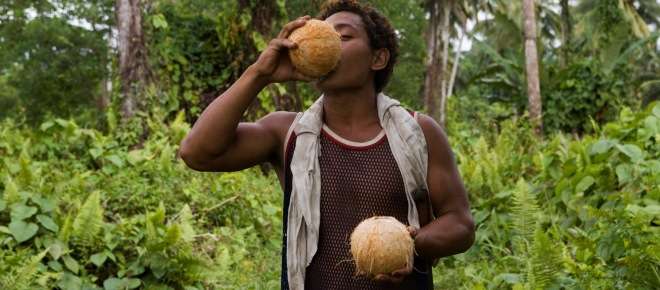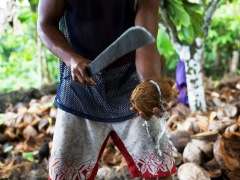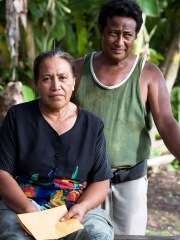No-one should starve in Samoa. That is the truth of it. The soil is rich and fertile. But if you need to pay the power or water bill or send your kids to school, then you need a cash income. And that’s a different story altogether.

No-one should starve in Samoa. That is the truth of it. The soil is rich and fertile. But if you need to pay the power or water bill or send your kids to school, then you need a cash income. And that’s a different story altogether.
After decades of sending Samoa’s brightest and strongest to work overseas and funnel money back to the islands, Samoan farmers are showing there is a way to stay on the land and make a living.
Meet Kelemete and Selesa Luagalausefo
 Back in January this year, Kelemete and Selesa Luagalausefo of Sagone and their two sons, Molieli and Eli, learned how to hand-press virgin coconut oil with help and training from Oxfam’s partner, Women in Business Development Inc (WIBDI).
Back in January this year, Kelemete and Selesa Luagalausefo of Sagone and their two sons, Molieli and Eli, learned how to hand-press virgin coconut oil with help and training from Oxfam’s partner, Women in Business Development Inc (WIBDI).
The family was set up with a coconut drier, two grating machines, scales and a metal coconut oil press. They were also taught how to grade coconuts to get the best quality possible. The process has virtually no waste because the coconut shells and husks can be used to fuel the drier and the leftover pressed coconut gratings are fed to the pigs.
Now the family is providing oil weekly to WIBDI, which in turn exports the oil to international cosmetic retailer The Body Shop, under its fair trade programme. Kelemete says the family has gone from producing one to one-and-a-half buckets to 10 or 11 buckets a week.
“We are very pleased with the business because it has helped us fulfil our obligations to the village, family and the church. And it has helped pay for my youngest daughter to attend the National University of Samoa. Now we do not have to ring family overseas for money.”
“Starting the business was hard,” says Selesa. “But now we are used to it, the business has become our “faletupe” (bank).”
 Meet Taga, Faiumu and Faiesea Faimafili
Meet Taga, Faiumu and Faiesea Faimafili
Further up the road in Taga, Faiumu and Faiesea Faimafili are busy drying coconut for pressing. Tossing the grated coconut with flat wooden rods to keep it from burning, the couple is surrounded by family members who are part of their work force. Moments later, a truck pulls up laden with fresh coconuts from the plantation.
The family joined Women in Business coconut oil producers in 2003 and since then life has changed for the better. They now can keep up with family obligations, have built a modern house with a water tank, bought a truck and, most importantly, are financially independent. Faiumu says he also no longer relies on remittances from overseas family.
“I would like to see more families involved in farming. I say stay on the land, don’t throw it away.”
Sustaining rural life
For more than two decades, WIBDI has being finding ways to sustain rural Samoans in the village. WIBDI director Adimaimalaga Tafuna’i says in Samoa you need cash “and agriculture is a wonderful, abundant and sustainable way to make a living.”
Currently more than 700 Samoan families, working on 33,000 hectares of land, five processing companies and four entire villages are fully organically certified to international standards.
WIBDI’s efforts were rewarded in 2008 when The Body Shop came to them looking for a supplier of virgin coconut oil for its products. Over the last few years, WIDBI has exported almost 45 tonnes to The Body Shop.
The international demand for the Body Shop’s virgin coconut oil products has meant the demand sometimes outstrips what the Samoan farmers can supply. So WIBDI is looking to share its markets with other Pacific countries, such as Tonga, helping yet more Pacific farming families earn a sustainable living from the land.
Meanwhile back in Taga, Faiumu is cleaning up after a productive day making oil. He says one day he would like to visit The Body Shop and see what becomes of his oil.
Adimaimalaga says anything is possible with faith and hard work.
Adapted from the story written by WIBDI’s Faumuina Felolini Tafuna’i.



 Meet Taga, Faiumu and Faiesea Faimafili
Meet Taga, Faiumu and Faiesea Faimafili